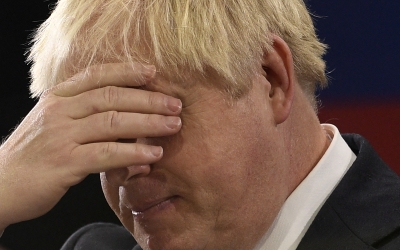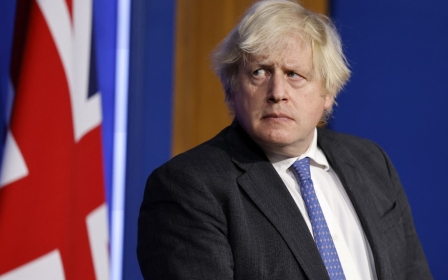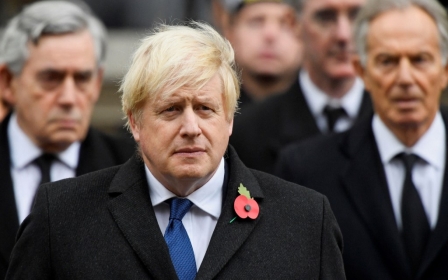Sue Gray report: What lies ahead for Boris Johnson

The Conservative party has long been renowned as the most ruthless political organisation in the western world.
That explains why changes of Tory leadership are never carried out for reasons of principle, morality, or affection. Only one thing matters in the Conservative mind: power.
A growing number of Tory MPs want Johnson out because they have concluded that he will lose them their seats at the next election
The Tory party calculates that without power everything else is pointless. A rational but heartless calculation that explains why the Conservatives, and not the liberal left, have governed Britain for most of the past two centuries.
A calculation that also explains why the party has turned on British Prime Minister Boris Johnson this week. Calls for a vote on the prime minister's leadership have not suddenly mounted because Johnson and his squalid associates are venal - though they are.
New MEE newsletter: Jerusalem Dispatch
Sign up to get the latest insights and analysis on Israel-Palestine, alongside Turkey Unpacked and other MEE newsletters
Not because he’s a scheming liar – though he is. And not because he’s a lazy leader whose incompetence daily diminishes the respect in which Britain is held across the globe – though all this is true.
A growing number of Tory MPs want Johnson out because they have concluded that he will lose them their seats at the next election.
A significant rebellion
When the report by civil servant Sue Gray into Downing Street breaches of Covid-19 guidelines was published last week, breathless reports from the still loyal Tory press deemed that Johnson (dubbed the "greasy piglet") had got away with it.
But MPs met a furious reaction to the revelation about Johnson’s conduct when they returned to their constituencies at the weekend.
With the consequence that a growing number are convinced the party faces obliteration at by-elections at Tiverton and Wakefield set for 23 June, followed by a meltdown in a general election under Johnson’s discredited leadership.
Hence the calls for the prime minister to go.
At the time of writing, 41 Tory MPs are now publicly questioning the prime minister’s leadership, with 31 of those actually calling for Johnson to quit.
This is a significant rebellion, and worryingly for Johnson, it represents MPs from all sides of the party, as analysis in the Daily Telegraph shows on Wednesday. More worrying still, the experience of past leadership elections shows that those who publicly speak out tend to be outnumbered by rebels who prudently choose to manoeuvre behind the scenes.
So, it is undeniable that Johnson’s position has become more perilous over the last few days. However, the prime minister is not finished.
The situation may change, but at this stage, a long drawn out fight to the death looks more probable than a sudden defenestration. To understand why it is essential to grasp the Tory Party leadership rules.
Leadership rules
The party rules make it difficult - though not impossible - to dislodge a sitting leader, even one as reckless and widely despised as Johnson. The rules state that to trigger a leadership challenge, 15 percent or more of Tory MPs must write a letter saying they do not feel confident in the leader.
Remember that the Tory press still strongly supports Johnson. So do party donors, some of whom may be on the look out for government contract
There are today a total of 359 Conservative MPs, meaning that the magic number needed to trigger a contest is 54.
These letters must be sent to the chairman of the 1922 Committee, the parliamentary group which represents all backbench Conservative MPs. The current chairman is Sir Graham Brady. Apart from Sir Graham, nobody knows how many letters he’s received, and he’s not telling.
Once the threshold of 54 letters is reached, Sir Graham is obliged to instruct Johnson to call a no-confidence vote. This is a short, sharp process - confined to Tory MPs and over in a matter of days.
If this contest occurs Johnson’s enemies will need the support of half the parliamentary party – 180 votes - to force the prime minister out of office. Anything short of that figure, and Johnson is fully within his rights to stay in Downing Street.
Some good judges at Westminster think that Sir Graham may have already received the necessary 54 letters and is loyally keeping quiet until the Queen’s Jubilee celebrations are over before he makes an announcement.
If that’s true the process will start - and might even finish - next week. Since it is unlikely that 180 MPs will vote against Johnson, he may well survive.
Past experiences
Does this mean that Boris Johnson’s leadership problems are over? Certainly not, as the record of past Tory prime ministers vividly demonstrates.
In 1989 seemingly impregnable Margaret Thatcher was challenged (under different party rules) by an unknown backbencher called Sir Anthony Meyer. Though he received just 33 votes, the challenge sent out the message the Conservative Party was split and weakened.
Thatcher was despatched within a year.
In December 2018 Theresa May saw off a no-confidence vote by 200 votes to 117. She carried on, but the vote had shown that one-third of Tory MPs opposed her leadership. Six months later she resigned.
This past experience offers a clue as to what lies ahead for Boris Johnson.
His opponents will probably secure enough votes to force a vote of no-confidence before parliament rises for the summer in July. Johnson will probably win that vote and carry on. Thereafter, we may be talking about a slow, attritional, political death by a thousand cuts.
Expect many more lies, fresh scandals, and in due course resignations from the despairing Tories. Expect Johnson to respond by seeking to regain popularity by mounting fresh culture wars.
Remember that he has powerful supporters. Remember that events can change the equation - Johnson looked finished when the war in Ukraine saved him three months ago.
Remember, too, that Johnson is a more resourceful leader than critics allow, with a record of winning elections. Remember that the Tory press still strongly supports him. So do party donors, some of whom may be on the lookout for government contracts.
That's why Britain is likely to struggle on rudderless and with an increasingly despised leader into the foreseeable future.
Chaos and shambles lie ahead.
The views expressed in this article belong to the author and do not necessarily reflect the editorial policy of Middle East Eye.
Middle East Eye delivers independent and unrivalled coverage and analysis of the Middle East, North Africa and beyond. To learn more about republishing this content and the associated fees, please fill out this form. More about MEE can be found here.







